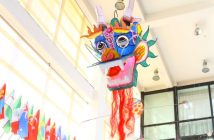
I did not expect how much we would miss baseball the first summer we lived in China.When I was packing my suitcases that winter, I didn’t even bother to include baseball gear. Myles was then only 3 years old, a little young for organized ball – not that I was aware of any to be had in Shenzhen anyway. Besides, I wasn’t sure what it might signal about us if I clung to seemingly extraneous bits of our American culture. It would soon become apparent how much we really needed to keep some baseball with us.
One afternoon, Myles and I were dawdling in Jusco, enjoying the air-conditioning more than the merchandise. We wandered into the sporting goods department, where we found a rack of baseball mitts of all sizes, as well as balls and bats. Myles was immediately excited; we could have baseball in China!
That was when I realized that, yes, he and I both missed baseball. We longed for afternoons at Pittsburgh’s baseball park, even though the Pirates were more likely to lose than win at that time. We yearned to watch my nephew’s Little League tournaments. It was our first summer without baseball, and yet we felt the absence more acutely than I would have ever anticipated.
That day, we bought some baseball equipment and spent all summer seeking out space in neighborhood playgrounds where we could toss the ball and even try a little hitting. I learned some of my first words in Mandarin, if only to explain what we were doing with a little white ball, a long dangerous stick, and a large glove on one hand. We were practicing bangqiu, we would say, and this funny-looking thing on my left hand was bangqiu shoutao. But even then, it was a largely lonely pursuit.
After our family’s move to Beijing, we were fortunate to find Sports Beijing, which provided plenty of opportunities for our children to participate in organized sports (which I wrote about in the August 2011 issue of beijingkids). Both Myles and Brigid joined baseball.
It was wonderful to be around other families, expat and local, who were interested enough in baseball to ensure the game could be played the way it was meant to be. We even had access to a proper baseball diamond thanks to ISB. My bangqiu Chinese grew beyond those first few words as we interacted more with Chinese-speaking players on the Shunyi-based team.
Living in Changping, we make do when practicing on our own; often, a corner of a dusty public soccer pitch serves our purposes. We discovered that we aren’t the only people in the area playing baseball. Down the street from our apartment is the Chinese University of Political Science and Law (CUPL), which fields an intercollegiate baseball team, albeit without actual baseball fields. The school allocated a small area to the team, enough for a batting cage and something like a base path for drilling defensive plays. A few times, we have practiced alongside CUPL players, our common enthusiasm for this sport crossing cultural, linguistic, and even age gaps. Like us, the CUPL team practices in whatever kind of space they can create and travels to other parts of Beijing for their actual games.
I couldn’t foresee how we would need baseball going into that first summer in China. In the beginning, it was just about keeping homesickness at bay. Now, however, baseball has grown to represent what sport can be – an experience shared across any kind of difference.

About the Illustrator
Linda Park (South Korea) is an IB higher level art student in Grade 11 at the Western Academy of Beijing. Now in her third year at the school, she’s particularly interested in using watercolor materials with pen and ink. Linda’s inspirations for this month’s illustration include personal experiences and images she found on the Internet.
This article originally appeared on page 57 of the beijingkids June 2015 issue. Click here to read the issue for free on Issuu.com. To find out how you can get your own copy, email distribution@truerun.com.



